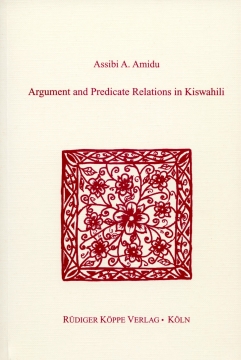
Argument and Predicate Relations in Kiswahili
A New Analysis of Transitiveness in Bantu
Author: Assibi Apatewon Amidu. Series edited by: Wilhelm J.G. Möhlig †, Bernd Heine.
Series: GA Grammatical Analyses of African Languages Volume 18
200120 pp. Roman, 506 pp.
numerous tables and charts
Text language(s): English
Format: 160 x 240 mm
740 g
Paperback
€ 69.80
Buy 'Argument and Predicate Relations in Kiswahili' as a downloadable PDF document directly from our online shop »
Order 'Argument and Predicate Relations in Kiswahili' as print edition »
Transitiveness in languages has always assumed the presence of a subject external argument and an object internal argument in predication-sentence structure. It also divides predicates into transitive and intransitive predicates. The book argues that in Kiswahili and Bantu, so-called intransitive predicates are transitive or can be transitivized by a principle called the principle of extended predication (PEP). The PEP reveals that passive, stative, reciprocal, and other traditional intransitives are transitives, and allow so-called agent or agent-like phrases as syntactic objects, and they undergo object relativization operations. Nominal predicates (prepositions) make this process possible. PPs are themselves arguments in Kiswahili and Bantu and they generate subject and object agreements and allow object relativizations. It is argued that only argument elements of transitive predicates can undergo object relativization in Kiswahili and Bantu. This is because the domain of relativization is always a predicate in Kiswahili.
The work further shows that subject plus object can and do share a single subject agreement marker in Bantu while the object or object-like NP is in its base. It also draws attention to SOV and OSV structures in Kiswahili and shows them as confirming the transitiveness of predicates generally, including passives, statives, etc. in the language under description.
The work concludes that we need to recognize a category called the Object Agent (OA) in linguistic descriptions and abandon the claim that agent theta in the world’s languages does not function as object due to structural and morphological constraints in predication-sentences.
Under these links you will find publications by the author and further analyses of Swahili grammar and of related Bantu languages:
Accompanying material:
- Classes in Kiswahili
(ISBN 978-3-89645-022-7 ) - Locative and Non-locative in Kiswahili Bantu
(ISBN 978-3-89645-713-4 ) - Matrix Nominal Phrases in Kiswahili Bantu
(ISBN 978-3-89645-550-5 ) - North-South Contributions to African Languages
(ISBN 978-3-89645-889-6 ) - Objects and Complements in Kiswahili Clauses
(ISBN 978-3-89645-560-4 ) - Pronouns and Pronominalizations in Kiswahili Grammar
(ISBN 978-3-89645-543-7 ) - Reflexive and Reciprocal Syntax Revisited
(ISBN 978-3-89645-707-3 ) - Reflexives and Reflexivization in Kiswahili Grammar
(ISBN 978-3-89645-028-9 ) - Semantic Assignment Rules in Bantu Classes
(ISBN 978-3-89645-703-5 ) - Transitivity in Swahili
(ISBN 978-3-927620-37-7 ) - Transitivität und Verbvalenz im Swahili
(ISBN 978-3-89645-712-7 )
Cross-reference:
- A Sketch of Swahili Morphology
(ISBN 978-3-927620-16-2 ) - Bantu Languages
(ISBN 978-3-89645-705-9 ) - Dialektologie des Komorischen
(ISBN 978-3-89645-702-8 ) - Domains and Regions in Bantu Tense and Aspect
(ISBN 978-3-89645-772-1 ) - Issues in Bantu Tonology
(ISBN 978-3-89645-033-3 ) - Les extensions verbales en swahili standard
(ISBN 978-3-89645-907-7 ) - Mgombato – Digo-Swahili-English Dictionary
(ISBN 978-3-89645-700-4 ) - Swahili Phonology Reconsidered in a Diachronical Perspective
(ISBN 978-3-927620-38-4 ) - Swahili-Handbuch
(ISBN 978-3-927620-06-3 ) - The Bantu Bibliography
(ISBN 978-3-89645-181-1 ) - Transitivity in African Languages
(ISBN 978-3-89645-726-4 )
| « back | Print version | [top] |
 Books
Books Audio
Audio Biographies
Biographies Series
Series Festschrifts
Festschrifts Journals
Journals